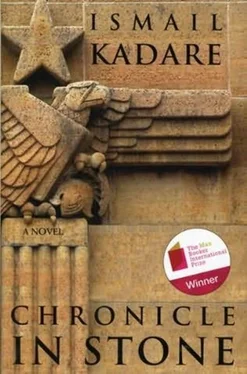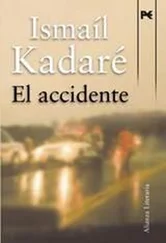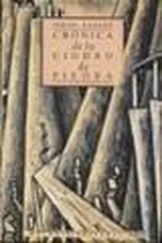Ismaíl Kadaré - Chronicle in Stone
Здесь есть возможность читать онлайн «Ismaíl Kadaré - Chronicle in Stone» весь текст электронной книги совершенно бесплатно (целиком полную версию без сокращений). В некоторых случаях можно слушать аудио, скачать через торрент в формате fb2 и присутствует краткое содержание. Жанр: Современная проза, на английском языке. Описание произведения, (предисловие) а так же отзывы посетителей доступны на портале библиотеки ЛибКат.
- Название:Chronicle in Stone
- Автор:
- Жанр:
- Год:неизвестен
- ISBN:нет данных
- Рейтинг книги:4 / 5. Голосов: 1
-
Избранное:Добавить в избранное
- Отзывы:
-
Ваша оценка:
- 80
- 1
- 2
- 3
- 4
- 5
Chronicle in Stone: краткое содержание, описание и аннотация
Предлагаем к чтению аннотацию, описание, краткое содержание или предисловие (зависит от того, что написал сам автор книги «Chronicle in Stone»). Если вы не нашли необходимую информацию о книге — напишите в комментариях, мы постараемся отыскать её.
Chronicle in Stone — читать онлайн бесплатно полную книгу (весь текст) целиком
Ниже представлен текст книги, разбитый по страницам. Система сохранения места последней прочитанной страницы, позволяет с удобством читать онлайн бесплатно книгу «Chronicle in Stone», без необходимости каждый раз заново искать на чём Вы остановились. Поставьте закладку, и сможете в любой момент перейти на страницу, на которой закончили чтение.
Интервал:
Закладка:
During the first bombing raids, discussion of Dino Çiço’s new invention, which would not only assure defence of the city but would also bring honour to its name, became more and more frequent, especially among the old and the very young. Aircraft that run without fuel are the most powerful of all. Fuel-free aircraft are fantastic. They can stay up in the air all day long. My aunt claims they can fly even longer. Can they stay up five days in a row? No, not five days. But why doesn’t he build this plane right away? What is he waiting for? Patience, my boy, these things can’t be done in a hurry…
So we waited.
In the meantime, planes of various kinds, their origin generally unknown, often flew over the city. Every time we raised our eyes to their shining bellies swollen with bombs we would look automatically towards the dark house with ramshackle eaves, whose owner never ventured out. He was working. Day and night. Go ahead, fly, fly, fly while you can, you pitiful engine-powered planes!
We tried to imagine the chaos Dino Çiço’s perpetual motion plane would wreak in the sky when it first took flight. Black and terrifying, with its strange shape, it would cleave the sky. All the world’s planes would flee in terror at the sight of it, tearing off in all directions, some south, some north; others, in total panic, would nose-dive and crash.
But for the moment the city was being bombed regularly every day. Planes circled overhead, quite at ease in the sky. The anti-aircraft battery, which was supposed to have been sent the previous week to defend the city, still hadn’t come. After the very first bombing we had all been convinced that besides streets, chimneys and sewers, a city had to have an anti-aircraft battery as well. The old gun, left in the citadel’s western tower since the days of the monarchy, had some defect that the municipal mechanics hadn’t been able to fix.
The city lay completely defenceless under the autumn sky, which everyone thought looked more open than usual. Never had people craned their necks to peer up into the sky as often as they did that autumn. It was as if they were asking in amazement, “What’s the matter with this sky all of a sudden?” For planes were something new in that ancient sky. The thunder, clouds, rain, hail and snow which the sky had always dropped on the city and about which no one was so unreasonable as to complain were nothing compared to this baleful whim of old age. There was something strange and faithless in the heavy masses of cloud and the blue slits that opened suddenly within them like gigantic eyes. The element of treachery was evident even in the monotonous drizzle of rain and the howling wind. More and more I thought that the world might be better off with no sky at all.
One of those autumn days something happened that I had long been waiting for. It was a Sunday. From the way Grandmother put on her black clothes and shawl I knew that something unusual was up. She had become almost miraculously agile. I soon realised that she was about to make an extraordinary visit. Open-mouthed, I watched her movements in silence, for fear that one word from me would break the tranquil harmony of the swishing of clothes and hands.
Quivering with excitement, I asked in a near whisper: “Where are you going?”
She stared at me. Her eyes were calm, just a touch far away. She slowly opened her mouth and said: “To Dino Çiço’s.” I had guessed as much.
“Take me too, please,” I begged. She stroked my hair.
“Get dressed,” she said.
The cobblestones in the street were wet. It was raining softly. An old song ran through my mind:
It’s raining, it’s pouring
Old dames are snoring…
I had become an old dame, one of the katenxhikas . Walking through the rain in my black dress. Going to have coffee. Going to see, going to hear. I was happy.
“Will we see the plane?” I asked.
“We’ll see it,” she said. “It’s right in the middle of the living room.”
“But can I see it close up?”
“Close up, yes, but behave yourself. Don’t touch anything.”
I looked at my hands. They were more nervous than I was. I put them in my pockets.
We got there. Grandmother banged the front door with the iron knocker. The knocking reverberated through the whole house. It was a somewhat unusual-looking house, with many gable-ends and overhanging eaves. It seemed to me to be dripping with sleep.
Grandmother knocked again. We heard no footsteps inside. But the door opened by itself. Someone, perhaps Dino Çiço himself, had lifted the latch with a string from upstairs. Our house also had a cord like that to open the door without going down. We went up the wooden spiral staircase. The scrubbed boards creaked, but the sound was different from the creaking of our own stairs. They spoke a language I didn’t know.
When we first went into the living room I didn’t see anything, because I was hiding behind Grandmother’s skirt. Then I peeked out and saw with one eye some old women dressed in black like Grandmother sitting on the cushions of the wooden ledges that ran around the room. The plane was in the middle. About the size of a person, all white, its wings spread. White. The wings, tail and body were wooden. Screw heads shone on the finely sanded carpentry.
I stared at it for a long time. The voices of the women came from afar, as if through a whistling wind. Then I looked up and saw the pallid man with his red and dreamy eyes turned to the floor.
“Is that him?” I whispered to Grandmother. She nodded.
The old women were chatting in pairs, sipping coffee. Their conversations sometimes got tangled with each other. They kept shaking their heads, expressing their amazement, gesturing in the direction of the plane, then going back to their talk of the war and the bombing. The pallid man did not speak. He never took his eyes off the wooden plane.
“Study hard, little lad, so that one day you’ll be as wise as Dino and bring honour to us all,” one of the old women said.
I moved further behind Grandmother. I don’t know why, but I felt no joy. It had oozed out of me as if through hundreds of little holes. But that didn’t last long. The empty space left in my body by departing joy was suddenly filled with something that flooded in through those same invisible holes. It was sadness. All at once the white plane in the middle of the room seemed to me the frailest, most pitiful thing in the world. How could it dare challenge the huge metal planes that flew overhead every day, those terrifying grey planes loaded with bombs and shaking with deafening noise? It would take them no more than a second to shatter this little white thing, like wild beasts tearing a lamb to pieces.
The old women went on chatting about all sorts of things. The lady of the house offered them more coffee. The pallid man hadn’t moved. I stood there too, still dazed. Very slowly, my sorrow gave way to complete indifference. I started looking at the old women’s wrinkles and was soon thoroughly absorbed by this new game. I had never examined old people’s wrinkles so carefully. How strange they were. They went on and on along an endless winding path from under the chin, down the neck, back up the nape and all over the face. They looked like the threads of wool that Grandmother spun from her distaff at the beginning of winter. Maybe you could knit socks with them, or even pullovers. I was getting very sleepy.
When we left Dino Çiço’s house, the rain had stopped. The wet cobblestones gleamed sardonically. They knew something. Two women leaning on their window-ledges chatted across the street. Further on three others were doing the same. They were shouting because their windows were far apart, so I heard the news too: an anti-aircraft battery had arrived.
Читать дальшеИнтервал:
Закладка:
Похожие книги на «Chronicle in Stone»
Представляем Вашему вниманию похожие книги на «Chronicle in Stone» списком для выбора. Мы отобрали схожую по названию и смыслу литературу в надежде предоставить читателям больше вариантов отыскать новые, интересные, ещё непрочитанные произведения.
Обсуждение, отзывы о книге «Chronicle in Stone» и просто собственные мнения читателей. Оставьте ваши комментарии, напишите, что Вы думаете о произведении, его смысле или главных героях. Укажите что конкретно понравилось, а что нет, и почему Вы так считаете.












